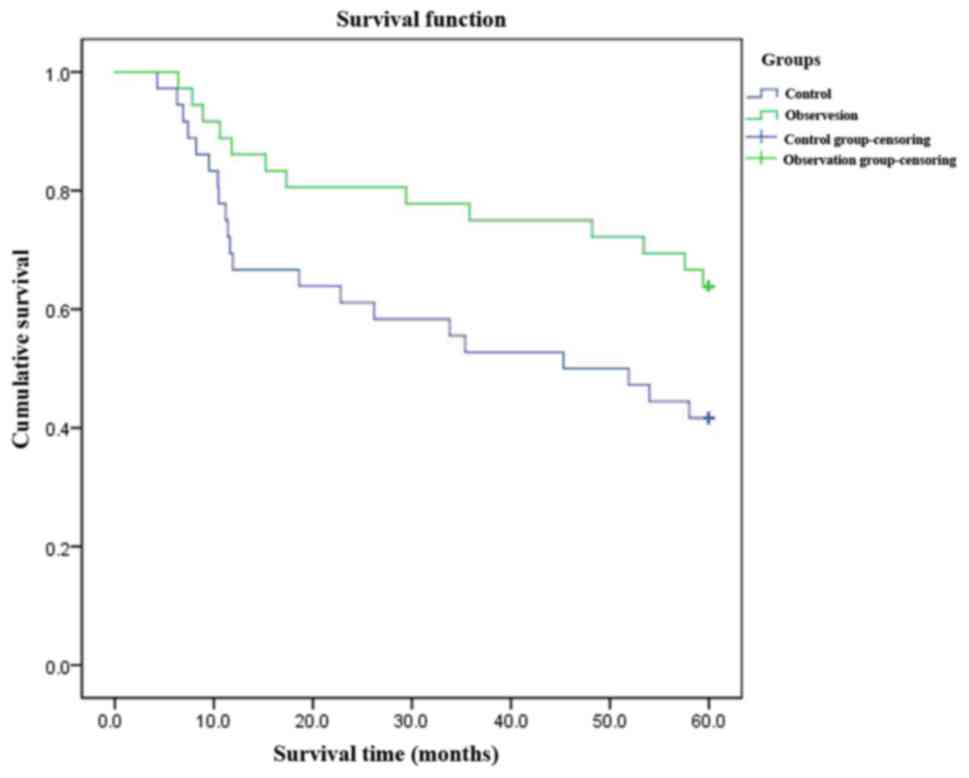|
1
|
Yung KW, Yung TT, Chung CY, Tong GT, Liu
Y, Henderson J, Welbeck D and Oseni S: Principles of cancer
staging. Asian Pac J Surg Oncol. 1:1–16. 2015.
|
|
2
|
Zheng YF, Tan LK, Tan BH, Sterling H and
Kane R: Principles of surgical oncology. Asian Pac J Surg Oncol.
1:17–26. 2015.
|
|
3
|
Nasir A, Reising LO, Nedderman DM, Fulford
AD, Uhlik MT, Benjamin LE, Schade AE and Holzer TR: Heterogeneity
of vascular endothelial growth factor receptors 1, 2, 3 in primary
human colorectal carcinoma. Anticancer Res. 36:2683–2696.
2016.PubMed/NCBI
|
|
4
|
Cabart M, Frénel JS, Campion L, Ramée JF,
Dupuis O, Senellart H, Hiret S, Douillard JY and Bennouna J:
Bevacizumab efficacy is influenced by primary tumor resection in
first-line treatment of metastatic colorectal cancer in a
retrospective multicenter study. Clin Colorectal Cancer. 7:15–16.
2016.
|
|
5
|
Nagasaka T, Mishima H, Sawaki A, Shimokawa
M, Inukai M, Shinozaki K, Tanioka H, Nasu J, Nishina T, Hazama S,
et al: Protocol of a randomised phase III clinical trial of
sequential capecitabine or 5-fluorouracil plus bevacizumab
(Cape/5-FU-Bmab) to capecitabine or 5-fluorouracil plus oxaliplatin
plus bevacizumab (CapeOX/mFOLFOX6-Bmab) versus combination
CapeOX/mFOLFOX6-Bmab in advanced colorectal cancer: the C-cubed
(C3) study. BMJ Open. 6:e0114542016. View Article : Google Scholar : PubMed/NCBI
|
|
6
|
Ocvirk J, Moltara ME, Mesti T, Boc M,
Rebersek M, Volk N, Benedik J and Hlebanja Z: Bevacizumab plus
chemotherapy in elderly patients with previously untreated
metastatic colorectal cancer: single center experience. Radiol
Oncol. 50:226–231. 2016.PubMed/NCBI
|
|
7
|
Silva GL, de Moura EG, Bernardo WM, de
Castro V Leite, Morais C, Baba ER and Safatle-Ribeiro AV:
Endoscopic versus surgical resection for early colorectal cancer-a
systematic review and meta-analysis. J Gastrointest Oncol.
7:326–335. 2016. View Article : Google Scholar : PubMed/NCBI
|
|
8
|
Probst A and Messmann H: Diagnosis and
endoscopic treatment of early colorectal cancer. MMW Fortschr Med.
158:47–49. 2016.(In German). View Article : Google Scholar : PubMed/NCBI
|
|
9
|
Bonetti L Reggiani, Di Gregorio C, de
Gaetani C, Pezzi A, Barresi G, Barresi V, Roncucci L and de Leon M
Ponz: Lymph node micrometastasis and survival of patients with
stage I (Dukes' A) colorectal carcinoma. Scand J Gastroenterol.
46:881–886. 2011. View Article : Google Scholar : PubMed/NCBI
|
|
10
|
Wolchok JD, Hoos A, O'Day S, Weber JS,
Hamid O, Lebbé C, Maio M, Binder M, Bohnsack O, Nichol G, et al:
Guidelines for the evaluation of immune therapy activity in solid
tumors: immune-related response criteria. Clin Cancer Res.
15:7412–7420. 2009. View Article : Google Scholar : PubMed/NCBI
|
|
11
|
Verdaguer H, Tabernero J and Macarulla T:
Ramucirumab in metastatic colorectal cancer: Evidence to date and
place in therapy. Ther Adv Med Oncol. 8:230–242. 2016. View Article : Google Scholar : PubMed/NCBI
|
|
12
|
Gasser M and Waaga-Gasser AM: Therapeutic
antibodies in cancer therapy. Adv Exp Med Biol. 917:95–120. 2016.
View Article : Google Scholar : PubMed/NCBI
|
|
13
|
Suenaga M, Mashima T, Kawata N, Wakatsuki
T, Horiike Y, Matsusaka S, Dan S, Shinozaki E, Seimiya H, Mizunuma
N, et al: Serum VEGF-A and CCL5 levels as candidate biomarkers for
efficacy and toxicity of regorafenib in patients with metastatic
colorectal cancer. Oncotarget. 7:34811–34823. 2016.PubMed/NCBI
|
|
14
|
Zong S, Li H, Shi Q, Liu S, Li W and Hou
F: Prognostic significance of VEGF-C immunohistochemical expression
in colorectal cancer: a meta-analysis. Clin Chim Acta. 458:106–114.
2016. View Article : Google Scholar : PubMed/NCBI
|
|
15
|
Yue GG, Kwok HF, Lee JK, Jiang L, Wong EC,
Gao S, Wong HL, Li L, Chan KM, Leung PC, et al: Combined therapy
using bevacizumab and turmeric ethanolic extract (with absorbable
curcumin) exhibited beneficial efficacy in colon cancer mice.
Pharmacol Res. 111:43–57. 2016. View Article : Google Scholar : PubMed/NCBI
|
|
16
|
Michl M, Stintzing S, von Weikersthal L
Fischer, Decker T, Kiani A, Vehling-Kaiser U, Al-Batran SE,
Heintges T, Lerchenmueller C, Kahl C, et al: FIRE-3 Study Group:
CEA response is associated with tumor response and survival in
patients with KRAS exon 2 wild-type and extended RAS wild-type
metastatic colorectal cancer receiving first-line FOLFIRI plus
cetuximab or bevacizumab (FIRE-3 trial). Ann Oncol. 27:1565–1572.
2016. View Article : Google Scholar : PubMed/NCBI
|
|
17
|
Yoshida M, Takagane A, Miyake Y, Shimada
K, Nagata N, Sato A, Ogata Y, Fukunaga M, Otsuka K, Takahashi T, et
al: A phase II study of third-line combination chemotherapy with
bevacizumab plus S-1 for metastatic colorectal cancer with mutated
KRAS (SAVIOR Study). Oncology. 91:24–30. 2016. View Article : Google Scholar : PubMed/NCBI
|















